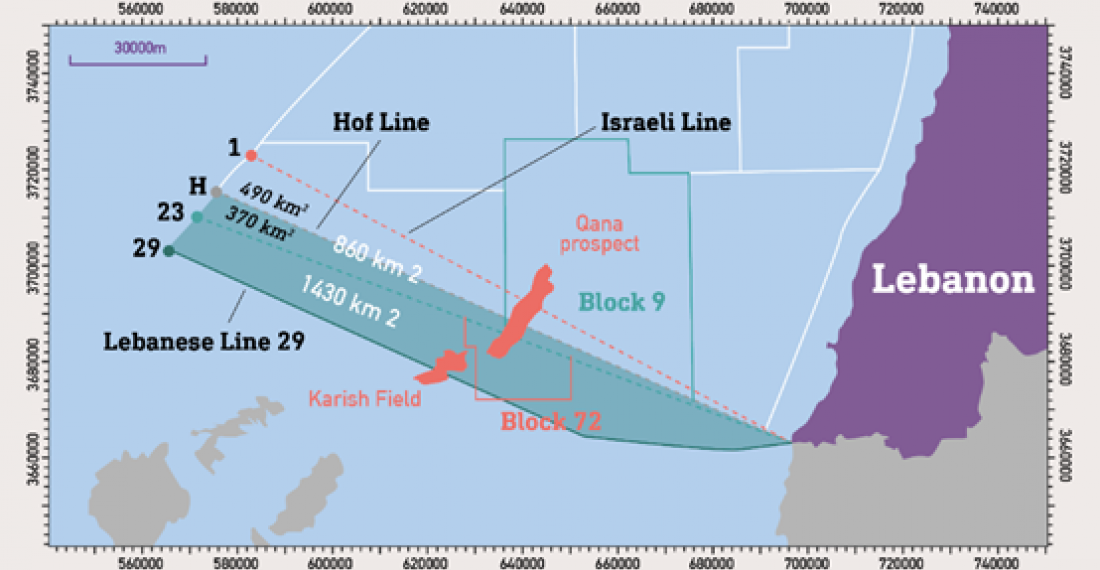Israel and Lebanon have been indirectly negotiating their maritime border since late 2020, with US mediation.
By LAHAV HARKOV
Israeli law requires the government to hold a national referendum on any agreement reached with Lebanon over the maritime border, the Kohelet Policy Forum think tank wrote, as the US-mediated talks between Jerusalem and Beirut appear to be coming to a close.
Israel and Lebanon have been indirectly negotiating their maritime border since late 2020, with US mediation. In the past week, Israeli and Lebanese officials have expressed hope that the talks are nearing a close, with US energy envoy Amos Hochstein meeting with the leadership in Beirut as well as with Prime Minister Yair Lapid.
Lapid updated ministers on the status of the talks in a Security Cabinet meeting on Wednesday.
While the sides have kept secret the details of the proposal on the table, Aharon Gerber and Ariel Ehrlich, two attorneys in the litigation department of the right-wing Kohelet Forum, expressed concern that it could involve Israel conceding part of its economic waters.
Basic Law: Referendum states, “[If] the government decided to sign an agreement by which the law, judiciary and administration of the State of Israel will no longer apply to a territory in which they apply – including an agreement including a future commitment and a conditional commitment... after approval from most of the Knesset – requires approval in a national referendum, unless approved by 80 members of Knesset.”
The second clause of the law states that the same applies even if the government gives up territory “not in the way of an agreement” – meaning unilaterally.
“In order to prevent a constitutional problem,” Gerber and Ehrlich wrote to Lapid, “we ask to warn about the requirement in a Basic Law for every international agreement in which there is a change in the territory on which Israeli law and administration apply.”
The Kohelet lawyers wrote that while the area under negotiation with Lebanon is beyond Israel’s territorial waters, Israeli law applies to them because they are on Israel’s “continental shelf,” adding that Jerusalem has also made that claim in the talks.
“We ask to warn about the requirement in a Basic Law for every international agreement in which there is a change in the territory on which Israeli law and administration apply.”Attorneys Gerber and Ehrlich
Territory in Israel’s economic waters falls under Israeli law, according to Israeli and international law, they wrote. It is under that law that Israel has licensed companies to look for and develop natural gas fields. The attorneys also referred to a 2018 Supreme Court ruling affirming their understanding of the situation.
“As such, the Government of Israel cannot sign an agreement that gives up territory without following the procedure in the Basic Law,” they wrote. “At the very least, it must conduct a thorough legal examination to reach a decision as to whether the Basic Law applies to concessions of territory in Israel’s economic waters.”
What are the disagreements?
Lebanon and Israel disagree on the status of an 860-sq.km. triangle in the Mediterranean Sea, which would be about 2% of Israel’s economic waters. Jerusalem originally agreed to split the area 58:42 in favor of Lebanon. Talks broke in 2021 down after four rounds when Beirut sharply increased its demands to almost triple the disputed area to 2,300 sq.km, abutting Israel’s Karish gas reservoir.
Hochstein and Lapid met in Jerusalem on Monday night; and the US envoy meeting with the prime minister and not the energy minister can be taken as a sign that the negotiations are almost complete.
“I remain optimistic that we can make continuous progress as we have over the last several weeks, and I look forward to being able to come back to the region to make the final arrangement,” Hochstein said, following a meeting with Lebanese President Michel Aoun, House Speaker Nabih Berri and Prime Minister-designate Najib Mikati on Monday.
Hassan Nasrallah, leader of the Iran-backed terrorist group Hezbollah, has repeatedly threatened Israel, including in the last week, over its development of the Karish gas reservoir, across from the Jewish state’s northern shores.
Energy Minister Karin Elharrar said on Sunday that she wanted “to make it as clear and unequivocal as possible that Karish is an Israeli reservoir,” and that Energean, the company licensed to extract gas from Karish, “will be able to produce gas for the local and export markets the moment they’re ready. It has no connection to Lebanon.”
Elharrar said that Israel’s proposal “can certainly help Lebanon – and I’m very hopeful that they will accept it.”
Source: https://www.jpost.com/middle-east/article-713788


.png)
